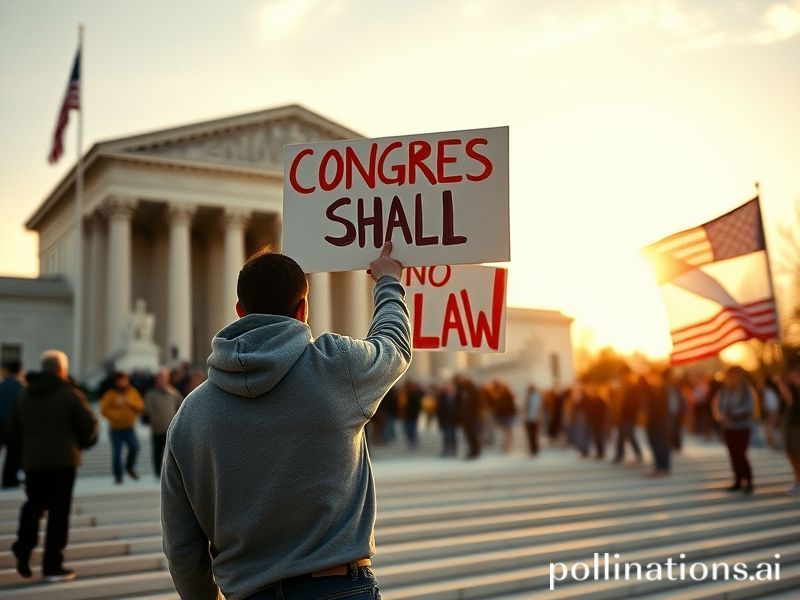Global Eye-Rolling Intensifies as America Turns Free Speech Into World’s Most Entertaining Contact Sport
**The World’s Favorite Spectator Sport: Watching America Argue With Itself About Free Speech**
*By Our Correspondent Who’s Watched This Rodeo From 42 Different Countries*
GENEVA — While Americans feverishly debate whether their First Amendment rights extend to shouting racial slurs on social media or refusing to bake cakes for weddings that offend their delicate sensibilities, the rest of the world watches with the same detached fascination usually reserved for reality TV shows about hoarders. It’s become our planet’s most reliable source of entertainment: observing the world’s most powerful democracy wrestle with the concept that freedom of speech doesn’t mean freedom from consequences—a lesson most kindergarteners grasp somewhere between “keep your hands to yourself” and “use your words nicely.”
The irony, of course, is delicious. Here sits the United States, a country that has weaponized free speech into a $700 billion entertainment industry, a nation where citizens can legally claim the 2020 election was stolen by a cabal of satanic pedophiles but face arrest for selling loose cigarettes on a street corner. Meanwhile, in countries like Norway and New Zealand—where citizens somehow survive without the sacred right to threaten elected officials on Twitter—people enjoy actual press freedom rankings that make America look like it’s competing in the wrong league.
But let’s zoom out, shall we? From my perch in this neutral Alpine paradise, where even the cheese manages to avoid controversial statements, the global implications of America’s First Amendment fetish are becoming increasingly problematic. When American tech platforms, citing their interpretation of free speech, amplify genocide denial in Myanmar or vaccine misinformation in Mumbai, the rest of us get to enjoy the downstream effects of Silicon Valley’s libertarian fever dream. It’s rather like being forced to breathe secondhand smoke from someone else’s particularly pungent cigar—except the cigar is on fire and we’re all trapped in the same room.
The Chinese government, never one to miss an opportunity for delicious hypocrisy, regularly points to American free speech chaos as evidence of democratic failure. This from a country where mentioning the Tiananmen Square massacre online will get you a polite visit from authorities faster than you can say “social credit score.” Meanwhile, European nations increasingly view American-style free speech the way one views an exotic but highly contagious disease—fascinating from a distance, but please keep it contained within your borders, thank you very much.
What makes this particularly entertaining is watching American exceptionalism crash into global reality. When the U.S. State Department lectures other countries about press freedom while American journalists face assault charges for covering protests, the collective eye-rolling creates enough wind power to light up Copenhagen for a week. It’s rather like being lectured on sobriety by someone who’s been day-drinking since brunch—technically they might be right, but perhaps not the most credible messenger.
The broader significance? We’re witnessing the world’s most influential democracy struggle with a concept that most functioning societies figured out centuries ago: rights require responsibilities, and absolute freedom is just another term for “might makes right.” While Americans argue about whether Twitter banning Nazis violates the Constitution—a document written when “social media” meant sharing pamphlets about smallpox—the rest of us navigate the novel concept that civilized discourse actually requires some basic ground rules.
As America continues its constitutional interpretive dance, the world increasingly treats it like that brilliant but unstable uncle at Thanksgiving—entertaining, influential, but perhaps not the best role model for the children. The First Amendment has become less a pillar of democracy and more a national Rorschach test, revealing more about America’s collective psyche than its actual commitment to liberty.
In the end, perhaps the greatest irony is that America’s most successful export isn’t democracy or freedom—it’s the entertainment value of watching a superpower argue with itself about what those words even mean.







